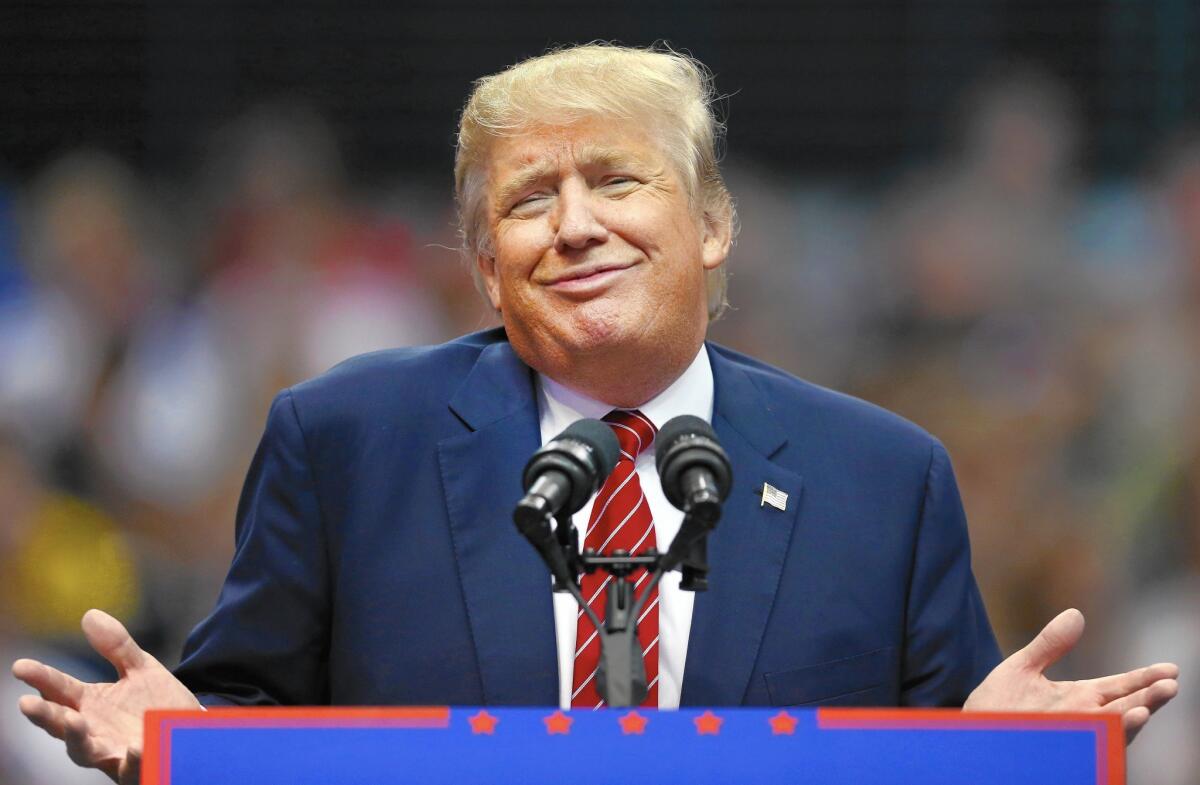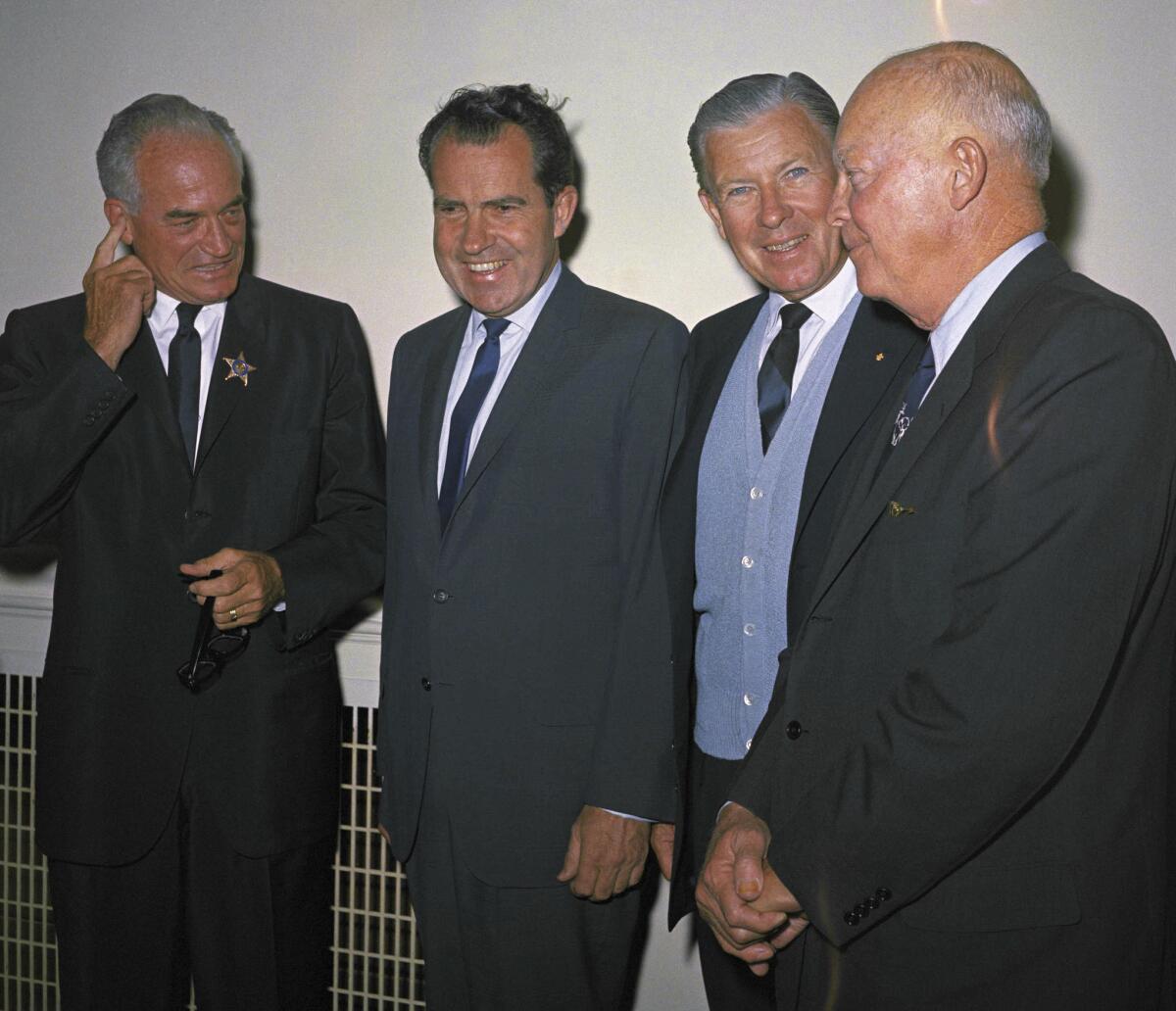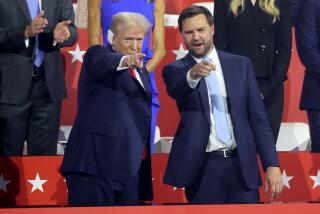Review: How the Republicans wound up with Trump: E.J. Dionne explains in ‘Why the Right Went Wrong’

- Share via
Wearing a charcoal-colored suit and pink tie, former House Speaker John A. Boehner announced his unexpected resignation last September. Unable to work with conservatives in his own party, Boehner warned of “irreparable harm” to the House should he stay on.
His departure did not have the desired effect. Instead of ensuring a smooth transition to a new speaker, Boehner’s announcement sent the Republican-controlled House into an apoplexy. When conservative critics torpedoed Boehner’s handpicked successor, House Majority Leader Kevin McCarthy (R-Bakersfield), several candidates launched and crashed like malfunctioning rockets. Paul D. Ryan (R-Wis.) ended the embarrassing episode a month later by grudgingly accepting the speakership.
------------
FOR THE RECORD:
Book title: A headline in the Jan. 17 Arts & Books section atop a review of the book “Why the Right Went Wrong” incorrectly called it “How the Right Went Wrong.” —
------------
Boehner’s rocky tenure set the stage for this turbulent chapter. Unanimously promoted to speaker in 2011 in the wake of the GOP’s takeover of the House, Boehner oversaw a caucus eager to turn routine tasks into showdowns with the president. The repeated face-offs paralyzed the legislative body, often preventing it from fulfilling its basic functions, and escalated into full-scale crises when tea party leaders threatened to default on the government’s debt during prolonged budget battles in 2011 and 2013.
Though Boehner went along with this brinksmanship, shutting down the government, sending shockwaves through global stock markets and instigating a historic downgrade of the Treasury’s creditworthiness, his willingness to risk the nation’s economic welfare in a game of chicken with the president didn’t satisfy the very tea party legislators pressing him to keep fighting. Instead, the enmity between the speaker and his critics grew so large that Boehner teamed with Democrats to approve key legislation such as the groundbreaking Pacific-Rim trade deal. Branded a traitor by the Freedom Caucus, a group of House archconservatives forged last year, Boehner resigned.
In “Why the Right Went Wrong: Conservatism — From Goldwater to the Tea Party and Beyond,” E.J. Dionne Jr. identifies Boehner as the latest in a long series of Republicans transformed from conservative hero to villain. “The history of contemporary American conservatism,” Dionne writes, “is a story of disappointment and betrayal.” Other than Ronald Reagan, who has been spared this fate despite compromising with Democrats on taxes and nearly tripling the national deficit, almost every major Republican figure has suffered Boehner’s fate since the 1960s.

Left to Right: Sen. Barry Goldwater; President Richard Nixon, vice president; George Murphy and Dwight D. Eisenhower, former president at a luncheon at the Mark Hopkins Hotel in San Francisco on July 14, 1964.
Richard Nixon was the first to be cast a turncoat. Operating as a centrist, he failed to usher in the conservative epoch he had promised. George H.W. Bush angered the far right by reneging on his famous “read my lips” pledge on taxes. Even with these disappointments, perhaps no one personifies Dionne’s hypothesis better than Bush’s eldest son, a candidate who relied on his gold-plated conservative credentials to stoke the right wing of his party. Yet after eight years in power, in which the federal government continued its exponential expansion, illegal immigration soared and the nation lurched ever leftward on social issues ranging from abortion to gay marriage, his tenure helped foment the tea party.
In Dionne’s analysis, Republican leaders fueled this cycle by espousing a far-reaching conservative agenda to rally the party’s base. Once in office, however, they governed with the limitations of operating in a two-party system and the public’s unwillingness to accept the party’s austere anti-government measures. Unable to live up to their rhetoric, Boehner and his ilk became the targets of right-wing purges.
By refusing to acknowledge this destructive cycle, the far right has convinced itself that only if an uncompromising ideologue — one philosophically purer than previous disappointments — is brought to power, she will bring forth a conservative Eden. This unbending conviction was by no means inevitable, Dionne argues: At every major juncture in the past half-century the party chose to galvanize its base with this path over moderate options.
See more of our top stories on Facebook >>
While the tea party and the Freedom Caucus are the latest embodiment of this cycle, Dionne tracks its origins to Barry Goldwater and far-right groups such as the John Birch Society. The head of the society, Robert Welch Jr., was so conservative he labeled former president and general Dwight D. Eisenhower “a dedicated, conscious agent of the Communist conspiracy” and spent years seeking Chief Justice Earl Warren’s impeachment. The society grew in stature from the late 1950s until 1964, when Goldwater and William Buckley jointly renounced Welch as a man “far removed … from common sense” in the National Review.
In today’s political climate, by contrast, radical views are not only allowed to fester, they are cheered along. Glenn Beck’s meteoric rise testifies to this metamorphosis. His paranoid-laced conspiracy theories would have confined him to the fringes of the GOP alongside the Birchers: in 2009-10, however, he was a bellwether on Fox News.
The Democrats also deserve some blame for the GOP’s rightward progression. Bill Clinton’s move to the right — announcing that the “era of big government is over” — engineered his presidental victories, yet conceded the nation’s ideological bearing to the GOP. Since then, Democrats haven’t positioned themselves as a compelling counterweight to the GOP’s ever-more conservative political discourse. It’s telling that the passage of the Affordable Care Act, the crowning legislative Democratic achievement of this generation, relied upon an insurance mechanism devised by conservatives over the single-payer system favored by the party’s faithful. If liberal Democrats are going to move the political conversation leftward, they’ll need to do a much better job of developing bold ideas.
Dionne, for one, is a liberal willing to take action in this relentlessly analytical — rather than partisan or ideological — critique of the Republican Party. Having covered politics for 25 years as an award-winning author and columnist, Dionne’s expertise is evident in this finely crafted and convincing work. He appears to have read nearly everything about the subject, including a bounty of conservative writers such as Ramesh Ponnuru and David Frum, and interviewed Republican insiders in preparing what amounts to a lamentation of the GOP’s trajectory over the past half-century.
At heart, Dionne is an empiricist, and his solutions reflect this worldview. He calls for a break with the cycle of false conservative hope followed by disappointment within the party. This transformation would require an ideological shift back toward the center, including GOP acceptance of the market’s drawbacks, seeing a role for the government in the modern economy, and a reversal on a broad range of issues, including taxes, healthcare and environmental regulation.
Lucid, pragmatic and buttressed by a parade of supporting facts, statistics and observations, Dionne’s prescriptions would hold up well in a debate. But it’s unlikely for the high-minded concepts Dionne preaches or the group of fledgling reformers he embraces to have much of an impact.
Much of the Republican Party has abandoned analytical reasoning and evidence-based policy positions. According to a 2014 Gallup poll, 65% of conservatives doubt the veracity of climate change, and seven years into Barack Obama’s presidency, they still demonize him as a foreign-born Muslim socialist out to destroy the United States.
Proclaiming Obama’s malevolence, the GOP has frequently blocked legislation, stalled confirmations, and rejected federal assistance to states out of spite for the president despite the detriment to Republican governors and their constituents.
This behavior may seem petty and irrational but should come as no surprise for observers of conservative media. Superstars such as Bill O’Reilly of Fox News and talk-radio maven Rush Limbaugh have used their megaphones to censure any deviation from a narrow set of values while depicting compromise and restraint as signs of cowardice. The prevalence of this rigidly-defined orthodoxy has endowed a paean of legitimacy to extremist positions and hyper-aggressive political tactics.
No one exemplifies this development better than Donald Trump. He has unapologetically run a xenophobic, chauvinistic and fear-mongering campaign that rarely even bothers to rely on euphemistic code words to convey his dispiriting message. Trump has remained the GOP front-runner despite lacking political experience and infuriating the party’s establishment. Republican stalwarts have distanced themselves from his incendiary comments. Major donors have balked at his populist message. Even the party’s kingmaker, Fox News, has repeatedly butted heads with Trump without denting his popularity. Republican voters have instead favored him throughout the pre-primary season, forcing his opponents to follow his lead.
If Trump’s demagoguery doesn’t persuade the party to reverse its uninterrupted march to the far right and to give up its dangerous reliance on inciting its base with ever grander yet perpetually unfulfilled promises, then perhaps nothing will. For Trump has become the apotheosis of a half-century of the GOP’s radicalization, an out-of-control Frankenstein who might destroy its very creator.
Bobelian writes about the Supreme Court and is working on a book about the Warren Court.
::
‘Why the Right Went Wrong: Conservatism — From Goldwater to the Tea Party and Beyond”
By E.J. Dionne Jr.
Simon & Schuster: 544 pp., $30
::
Other new books for the election season:
Let the People Rule: Theodore Roosevelt and the Birth of the Presidential Primary by Geoffrey Cowan (W.W. Norton: $27.95) How Roosevelt orchestrated the first presidential primary in so he could challenge his successor, William Howard Taft, from the outside.
Republic of Spin: An Inside History of the American Presidency by David Greenberg (W.W. Norton: $35) Since Woodrow Wilson held the first White House press conference, the executive branch has tried to tell its story with the help of professional spin doctors.
Plutocrats United: Campaign Money, the Supreme Court, and the Distortion of American Elections by Richard L. Hasen (Yale University Press: $TK) The Citizens United decision allowed unprecendented funds to flow into campaigns; Hasen looks at the problem and possible solutions.
Crisis Point: Why We Must – and How We Can – Overcome Our Broken Politics in Washington and Across America by Senators Trent Lott and Tom Daschle (Bloomsbury: $34) Former Senators Lott and Daschle reach across the aisle to call for a return to compromise.
Political Animals: How Our Stone-Age Brain Gets in the Way of Smart Politics by Rick Shenkman (Basic Books: $26.99) What can a sea slug tell us about our preferences? Even when we try to be rational, our decisionmaking may be guided by animal instincts.
More to Read
Sign up for our Book Club newsletter
Get the latest news, events and more from the Los Angeles Times Book Club, and help us get L.A. reading and talking.
You may occasionally receive promotional content from the Los Angeles Times.






